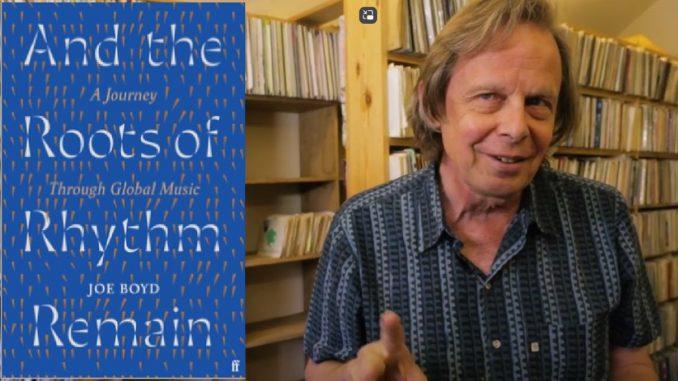The latest in Peter Culshaw’s peripatetic radio shows is a conversation with Joe Boyd whose recent tome, published by Faber, is a magisterial sweep through global and popular music called And the Roots of Rhythm Remain.
TO LISTEN TO THE SHOW
https://www.mixcloud.com/MusicBoxRadioUK/the-arts-desk-with-joe-boyd-thursday-9th-january-2025/
Boyd bridled when called a Zelig because “Zelig was just there and didn’t do anything” whereas he, au contraire, was definitely an active participant. He was at the sound desk when Bob Dylan shocked all by going electric at the Newport Festival in 1965, as featured in the new Dylan biopic (he now has some sympathy for how the folkies felt and remains sceptical of electronic rhythms and sampling).
He was key player in Swinging London as proprietor of the UFO club, produced the first Pink Floyd single “Arnold Layne”, which was banned by the BBC (it was about an English pervert). Boyd ended up running a global music label Hannibal, which put out a plethora of great music from Cuba to Bulgaria.
In the 1970s he produced many key artists like Fairport Convention and, notably, Nick Drake, who having sold only a few thousands before his suicide went on to become a major figure. Boyd convincingly points to the influence of the guitar playing of Bossa Nova pioneer João Gilberto on Drake, the kind of sometimes startling connections which are spread throughout the book.
The African, folk and Roma influence on Lizst, Bartók, Debussy and Steve Reich, among others, is clear – but the conversation runs both ways: you can find quadrilles in Guadeloupe now when you would be pushed to find them in Paris. James Brown was a big influence on African pop music, but then James Brown borrowed from Fela Kuti and was knocked out when he saw Fela (and more specifically, his drummer Tony Allen, who learnt from imported jazz magazines).
The show (and book) jumps from personal anecdote to deep research and on most pages there is something fascinating to discover. Like how the Ballet Russes were stranded in Havana in 1941 and some of them performed at the fabulously kitsch Tropicana club (the place where Liberace once made an entrance with a piano on the back of an elephant). The story of Cuban music and its imports and exports are brilliantly told. Or how “Back in the USSR” was written in Rishikesh, and the profound impact the Beatles had on destabilising communism. Boyd quotes a Russian who heard the first thirty seconds of “Girl” felt like hearing the truth for the first time.
Then there’s New Orleans as a portal into the US for all kinds of music, the amazing story of Django Rerinhardt, or the musicians from Caetano Veloso to Ivo Papasov exiled or jailed for their music, which only proves its power. You also get, on the way, the assorted adventures of Malcolm Mclaren and Paul Simons in South Africa. There was disagreemnt about the merits of Bollywood and Malcolm Mclaren, and the use of harmoniums in Qawalli music (Culshaw being more sympathetic and less "purist").
But, as Ry Cooder says, this highly readable book should be taught in schools. Everyone interested in music (which is nearly everyone) should read this wonderful banquet of a book
TO LISTEN TO THE SHOW
https://www.mixcloud.com/MusicBoxRadioUK/the-arts-desk-with-joe-boyd-thursday-9th-january-2025/
TO WATCH THE INTERVIEW (minus music)














Add comment